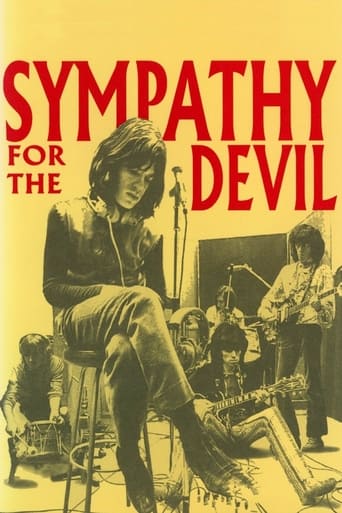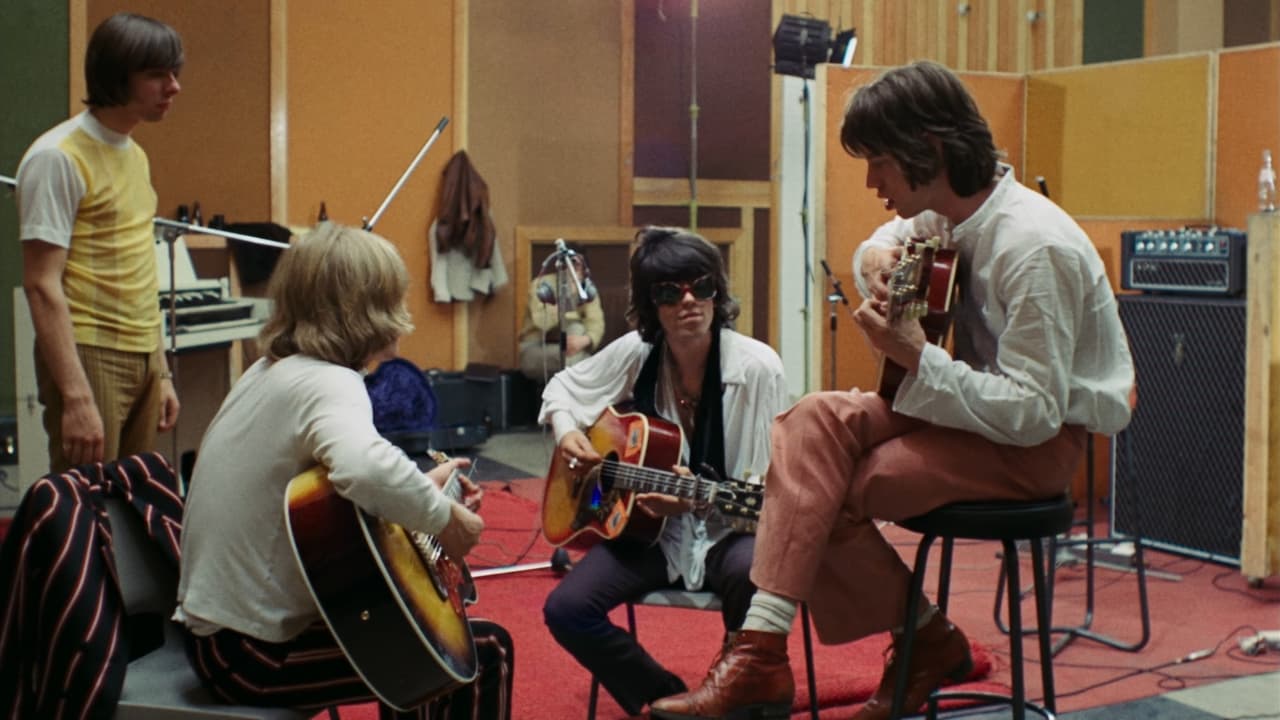preppy-3
Here we see the Rolling Stones creating the song "Symapthy for the Devil" in the studio. That footage is entertaining and fascinating. If they had just stuck to that this could have been a fascinating documentary. Naturally director Jean-Luc Godard (who I despise) single-handedly screws it up. He has somebody talking over the footage--some philosophical garbage which (as far as I could tell) had nothing to do with the movie or the song! To make matters worse he cuts to skits done by the Black Panthers in a junkyard (?????) Godard is trying to make some point but damned if I know what it is. I saw this with a roommate of mine (who idolizes the Stones) and he was ready to kick the TV screen in by the end. He was sick of all the endless talking and pointless politics. This may have meant something in 1968 but it doesn't now! Mick Jagger was once asked in an interview if he had any idea himself what those skits were doing in the film. He made it clear that he didn't have a clue and the director added them without telling the Stones. He didn't like it at all. Next to "Let's Spend The Night Together" this is the worst Stones film ever. Avoid---or watch it for the Stones and skip over the parts without them.
Roy Axford
I approach the film as a musician and Stones fan. My main interest is that it documents the creation of the version of SFTD that was released on Beggars Banquet. (The other scenes, in my opinion, are too dated to be worthy of further comment. You had to live through them to understand those times - there's really no explaining that wide and silly infatuation with Marxism today. But I do greatly enjoy the period book and magazine covers.) The song starts as a shadow of its subsequent self and at times it seems like the grind of the recording session will snuff it out altogether. The incorporation of the "samba" beat brings it to life and propels the session to a successful conclusion. I wish the final edit (of the film) more precisely captured this transition in the song's development. You can't really tell who's inspiration it was. Mick mentions that "other beat" at one point, but it's not clear (to me) if he's talking to Charlie or someone else. The segment documenting the recording of the "woo woo" backing vocals is a kick. It's great to see the studio, the vintage equipment including Vox amps, the clothes, and the interaction (or lack of it) between the band members. Bill Wyman often appears to be just along for the ride and at one point seems to resign himself to just using Keith's bass part recorded on the first day. Mick, Keith, and Charlie are clearly the most engaged in the session. The sad decline of Brian Jones, losing his health, creativity, and any position of influence in the band is painfully evident. In the beginning of the film, Mick is teaching the song to Brian as if he's teaching it to a child. Keith joins them and plays along, but doesn't even look at Brian. Subsequently, Brian sits by himself in a "recording cubicle" and is largely ignored except when Keith throws him a cigarette. The film is a gem of a time capsule for Stones fans, but I used fast forward to get through roughly half of it.
pninson
Jean Luc Godard's Marxist polemic is as close to unwatchable a film as you're likely to see from an internationally respected filmmaker. Bits of political theater, mind-numbingly boring and interminable, are interspersed with the making of "Sympathy for the Devil", featuring the Rolling Stones in the studio.The process of the song's development, from Mick Jagger playing a demo on acoustic guitar, to the backing vocals being recorded towards the end, is fascinating, and it's worth renting this film just to see the bits with the Stones. Almost half the movie is devoted to this, so thanks to the miracle of chapter stops, you can skip all the bizarre political skits and just watch the Stones put a song together.When I had this on laserdisc, I valiantly attempted to watch it all, but I don't see how anyone could get through it. I finally gave up and just chapter-skipped my way to the Stones segments.
Mnk!
It utterly defeats me why Godard is taken so seriously - and One Plus One is a great example of his ineptitude as both a filmmaker and an 'intellectual' polemicist. It's hard to credit that Godard actually believed all that Marxist and Maoist kant. Anyone with half a brain could work out the bankruptcy of those 'isms' and how many people they had destroyed and were continuing to destroy even as Godard was making his films supporting them. As a filmmaker, ask yourself: would you have boring voice-overs reading tedious political diatribes at your audience, and then, when you couldn't think of anything else to do, layer another voice-over to the first voice-over, which had lost its listeners after the first 100 words in any case? Brilliant, Jean-Luc! As for Godard insisting on making a film with the Rolling Stones: of course he did; wouldn't you? It was the only guarantee of getting such mindless rubbish seen in the first place: the genius of the Stones eclipsing a talentless and babbling political idiot set loose with a camera. The bookshop scene wasn't worthy of even the worst fringe theatre, and was an insult to the intelligence of even the young children who were used to play in it - as could be readily seen. Copping-out by allowing friendly critics to claim that all this artless crap was a satire on mainstream film-making is no more than a safe get-out to offer those who clearly see Godard's poverty of intellect and arrogant contempt for his audience. Ironic that Godard's one-time great friend, Truffaut, with Nuit Americain, made the best film about film-making ever, and Godard made the worst with Le Mepris! Incidentally, Godard didn't choose the Stones' track of Sympathy With the Devil. It just happened to be the track they were working on when the 'film' started shooting at Barnes Olympic Studios.



 AD
AD



